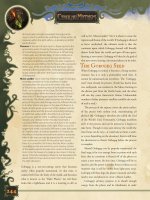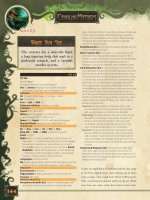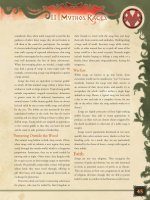Sandy petersens cthulhu mythos 320
Bạn đang xem bản rút gọn của tài liệu. Xem và tải ngay bản đầy đủ của tài liệu tại đây (436.57 KB, 1 trang )
IX Mythos Bestiary
Languages Common
SQ final change, hold breath, trapfinding +1
ECO LO GY
Environment any coastal
Organization solitary, pair, or mob (3–16)
Treasure NPC gear (leather armor, short sword, other
treasure)
Deep ones are synonymous with H.P. Lovecraft’s work
and are minions of the Great Cthulhu himself. A deep
one is a repulsive amphibian hybrid with a vaguely
humanoid form. They sometimes shamble upon two
limbs, and sometimes four. They can leap or hop as
well as walk or swim with natural grace. For more
detail on the culture of these aquatic creatures, see page
195.
Deep ones do not have a fixed size. When starved,
they shrink to tiny size. When overfed, they can grow
truly huge: 50-60 feet tall or more. The average deep
one is a little larger than a human, weighing some
300 lbs., and standing around 7 feet tall if not for its
Conquest through Breeding
To some, the deep ones’ ability to breed with any
creature implies they are not necessarily from the
sea (or, at least, don't have to permanently be sea
dwellers). It occasionally happens that a group of deep
ones break away from the normal sea habitat and live
in a freshwater environment, or even become wholly
terrestrial for a time. They can crossbreed with elves,
orcs, or even less savory creatures, and their dark
culture can infest any land.
When a deep one mates with a non-deep one
creature, the offspring initially appears to be a typical
specimen of the non-deep one parent. Typically, such
children are raised in secrecy away from society so
that they can grow up and complete their change.
In some cases, particularly those involving children
who are orphaned at young age, deep one young
normally hunched, almost crouched posture.
Deep ones are able to interbreed with
any vertebrate being. The offspring
look like the non-deep one parent,
but over the years they gradually
mutate
to
deep
one
form.
Humanoids are shaped much like
deep ones (two arms, two legs,
etc.), so the mutation process
is comparatively short for them,
requiring no more than a few
decades. Less humanoid
creatures, such as dolphins
or alligators, may take
longer. Of course, the
deep ones can also spawn amongst
their own kind. Deep ones’ offspring
ultimately combine aspects of both
parents.
313









